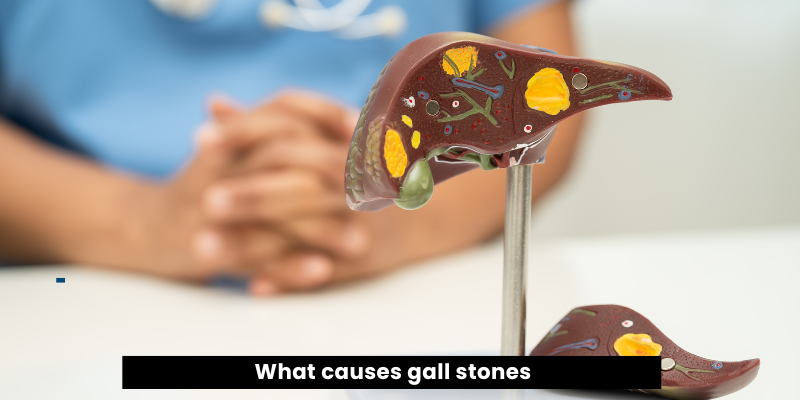What Causes Gallstones?
Gallstones form when the digestive fluid stored in your gallbladder hardens into solid deposits. These stones can range from tiny grains to large masses and are common among adults. Understanding what causes gallstones can help you prevent complications and seek timely treatment.
Too Much Cholesterol in the Bile
One of the most common causes of gallstones is excess cholesterol. When your liver produces more cholesterol than the bile can dissolve, the extra cholesterol crystallizes and forms stones.
High-fat diets, obesity, and metabolic issues increase this risk.
Excess Bilirubin Production
Bilirubin is a chemical produced when red blood cells break down. Certain medical conditions—including liver diseases, infections, and blood disorders—cause the body to make too much bilirubin.
This leads to pigment gallstones, which are darker and harder.
Poor Gallbladder Emptying
If the gallbladder doesn’t empty completely or often enough, bile becomes concentrated and thick. Over time, this concentration forms crystals that grow into stones.
This issue is common during pregnancy, fasting, or rapid weight loss.
High-Fat, High-Cholesterol, or Low-Fiber Diet
Unhealthy eating habits play a direct role in stone formation.
A diet high in:
Oily foods
Fried meals
Processed fat
Sugar
…increases bile imbalance.
A low-fiber diet also disrupts digestion, making gallstone development more likely.

Obesity & Rapid Weight Loss
Both extremes can trigger gallstones:
Obesity increases cholesterol in bile.
Rapid weight loss (crash diets, bariatric surgery, fasting) triggers the liver to release extra cholesterol into bile.
Hormonal Changes (Especially in Women)
Estrogen increases cholesterol levels in bile and reduces gallbladder movement.
This is why gallstones are more common during:
Pregnancy
Hormone therapy
Birth control pill use
Age, Gender & Genetics
Certain groups are naturally more prone to gallstones:
Women between 20–60 years
Individuals over 40
Those with a family history
Genetics affects how your body processes cholesterol and bile.
Medical Conditions That Increase Risk
Some health issues make gallstones more likely:
Diabetes
Liver disease
Crohn’s disease
Blood disorders (hemolytic anemia)
High triglycerides
These conditions alter bile composition or gallbladder function.
Frequently Asked Questions
What are gallstones?
Gallstones are hardened deposits that form inside the gallbladder when substances like cholesterol or bilirubin become imbalanced.
What causes gallstones?
Gallstones are mainly caused by excess cholesterol in bile, high bilirubin levels, poor gallbladder emptying, unhealthy diet, obesity, rapid weight loss, pregnancy, and genetics.
What are the symptoms of gallstones?
Common symptoms include upper abdominal pain, nausea, vomiting, bloating, indigestion, and pain after fatty meals. Some people may have silent gallstones with no symptoms.
